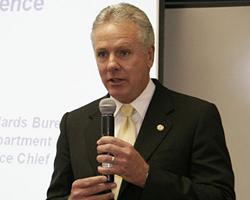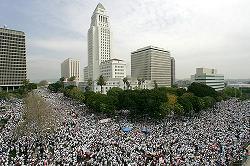Arizona’s strict new immigration law escalates, immigrant advocates are preparing to move the fight to the courtroom, where their legal challenges have successfully sunk other high-profile laws against illegal migrants.The American Civil Liberties Union, Mexican American Legal Defense and Educational Fund and the National Immigration Law Center are set to announce in Phoenix on Thursday plans to challenge the measure.
The law, which is set to take effect in mid-summer, makes it a state crime for illegal migrants to be in Arizona, requires police to check for evidence of legal status and bars people from hiring or soliciting work off the streets.
The key legal issue, according to lawyers on both sides, will be one that also was at the center of the court fight over Proposition 187 in California whether the state law interferes with the federal government’s duty to handle immigration.The announcement of legal action, one of several expected as attorneys across the country scrutinize the law for weaknesses, comes after days of frantic e-mails, conference calls and lengthy strategy sessions. Attorneys haven’t finalized when a court challenge would be filed, but said it would be before the law takes effect.
“The entire country has been galvanized,” said Marielena Hincapie, executive director of the National Immigration Law Center. “People within the legal community are trying to figure out what we can do…. We have seen an enormous amount of energy responding to this.”
Attorneys who successfully challenged laws against illegal immigrants in California, Texas and elsewhere argue that the Arizona law faces a similar fate because of the federal/state issue. Immigrant advocates also argue that the law could violate guarantees of equal protection if selectively enforced against certain ethnic groups.”The Arizona law is doomed to the dustbin of other unconstitutional efforts by local government to regulate immigration, which is a uniquely federal function,” said Peter Schey, a Los Angeles attorney who led both successful challenges to the 1975 Texas law denying illegal migrant children a free public education and the 1994 California initiative that would have barred public services to illegal migrants. Schey said he also planned to file a separate lawsuit.
But the attorney who helped write the Arizona law said he carefully crafted the measure to avoid those constitutional issues.Kris Kobach, a University of Missouri-Kansas City law professor who handled immigration law and border security under U.S. Atty. Gen. John Ashcroft during the Bush administration, said the law does not seek to regulate immigration but merely adds state penalties for what are already federal crimes.
Under the legal doctrine of “concurrent enforcement,” he said, states are allowed to ban what is already prohibited by federal law. As an example, he said, the courts have upheld efforts by Arizona, California and other states to enact sanctions against employers who hire illegal migrants.Kobach, who is running as a Republican candidate for Kansas secretary of state, also dismissed claims that the bill will result in racial profiling. He said he took care to include an explicit ban on using “race, color or national origin” as the sole basis for stopping someone to ask for papers.
“I anticipate that anyone who challenges the law will throw everything but the kitchen sink at this to see if it will stick,” Kobach said. “But this is consistent with federal law.”Indeed, immigrant advocates raise several legal questions. The portion of the law that prohibits laborers from soliciting work in public places is particularly vulnerable, said Thomas Saenz, president and general counsel of MALDEF.
The organization has successfully challenged similar laws in Arizona and California. In 2008, a federal judge ruled that an Arizona town could not enforce an anti-solicitation ordinance that advocates said infringed upon the free speech rights of day laborers.In addition, there probably will be due process claims because police officers won’t know who would be eligible for immigration relief, Saenz said. Many arrested won’t have the opportunity to make their claims in immigration court.”There are a lot of people who are going to be arrested and swept into this dragnet who have every right to be in this country,” he said.
Even before lawsuits are filed, immigrant advocates are seeking a commitment from federal officials that they will not enforce the law.On Tuesday, Homeland Security head Janet Napolitano testified before a Senate Judiciary Committee that the law could distract the agency from using its resources to go after serious criminals.”We have concerns that at some point we’ll be responsible to enforce or use our immigration resources against anyone that would get picked up in Arizona,” said Napolitano, who noted that she had vetoed similar measures as Arizona governor.
U.S. Atty. Gen. Eric Holder also said this week that he was considering a possible legal challenge to the law.Another lawsuit may come from one of Arizona’s own elected officials. Phoenix Mayor Phil Gordon said this week that he planned to file a lawsuit.”I have under the charter the ability given to me by the people to file a lawsuit on behalf of the people,” Gordon said Tuesday to cheers from a packed City Council meeting and one angry cry of “socialism!”
As both sides gear up for their legal battle, the wild card is the panel of judges who will end up deciding the case.Judges have ruled differently on key immigration questions. In 2007, a federal judge ruled that a Pennsylvania city couldn’t punish landlords who rent to illegal immigrants and employers who hire them. A federal judge also ruled against a Texas measure that sought to ban landlords from renting to illegal migrants.Advocates didn’t succeed, however, in getting the courts to block another Arizona law, which shuts down businesses for knowingly hiring illegal immigrants. In 2008, the U.S. 9th Circuit Court of Appeals in San Francisco refused to stop the law before it took effect, saying that businesses and immigrant rights groups hadn’t shown an adequate need for delaying enforcement.
Schey said he is not confident that legal challenges against the Arizona case would prevail in today’s political and legal climate. The U.S. Supreme Court is a very different panel today than it was when a narrow majority of 5 to 4 struck down the 1975 Texas law denying free education to unauthorized migrant children.”It’s a far cry from a slam-dunk case,” Schey said. “It’s a very close call with the current composition of the Supreme Court. What’s really needed here is federal leadership.”
But Erwin Chemerinsky, UC Irvine’s law school dean, argued that the Arizona law is a far more brazen attempt to regulate immigration than either the Texas or Proposition 187 cases. The Texas law was overturned primarily on equal protection grounds while the California law was struck down as an unconstitutional attempt to usurp federal immigration responsibility.”It is so firmly established that only the federal government can control immigration that I don’t see it,” he said, referring to chances that courts would uphold the Arizona law. “Even with a conservative court and a lot of sympathy to Arizona’s concerns, I don’t see it.”



